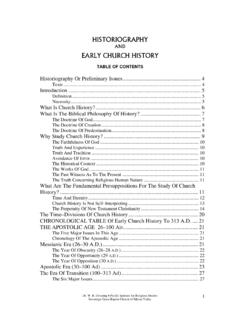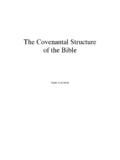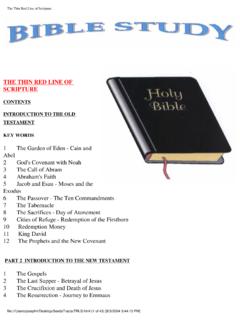Transcription of Covenant Theology and Dispensationalism: A …
1 Covenant Theology and dispensationalism : A Discussion of the Primary Issues Involved W. R. Downing Every Christian, Bible student, Bible teacher, biblical scholar, and preacher approaches the Scriptures from his given hermeneutical presuppositions. These may be correct or incorrect, mixed with a given amount of error, developed through personal study, inherited through religious tradition, received through formal or informal religious instruction, a seminary education or acquired through reading a given Study Bible. All believers have the same Bible, but often have diverse approaches to its interpretation.
2 All truth even God s Truth is necessarily interpreted according to one s presuppositions. This paper discusses two of the general hermeneutical approaches and the primary issues involved. There have been, since the early twentieth century and the advent of Dispensational teaching, two general, diverse approaches to biblical interpretation within Reformed and Evangelical Christianity and among Baptists: Covenant Theology and dispensationalism . Covenant Theology has been the historical theological biblical approach of both Reformed and Baptist Theology since the sixteenth century.
3 C. H. Spurgeon (1834 1892): The doctrine of the Covenant lies at the root of all true Theology . It has been said that he who well understands the distinction between the Covenant of works and the Covenant of grace, is a master of divinity. I am persuaded that most of the mistakes which men make concerning the doctrines of Scripture are based on fundamental errors with regard to the covenants of law and This can be noted by the Reformed and Old Baptist Confessions of Faith and the leading Baptist preachers and divines: The First London Baptist Confession (1644), Article 10: 1 Comments appended to the sermon, The Covenant , as quoted by Pascal Denault, The Distinctives of Baptist Covenant Theology , pp.
4 6 7. 2 Jesus Christ is made the mediator of the new and everlasting Covenant of grace between God and man, ever to be perfectly and fully the prophet, priest, and king of the Church of God for evermore. 1 Tim. 2:5; Heb. 9:15; John 14:6; Isa. 9:6 7. The Second London Baptist Confession (1689), Chapter 7: Of God s Covenant : 1. The distance between God and the creature is so great, that although reasonable creatures do owe obedience unto him as their creator, yet they could never have attained the reward of life but by some voluntary condescension on God s part, which he hath been pleased to express by way of Covenant .
5 Luke 17:10; Job 35: 7 8; 1 Tim. 2:5; Heb. 9:15; John 14:6; Isa. 9:6 7. 2. Moreover, man having brought himself under the curse of the law by his fall it pleased the Lord to make a Covenant of grace,2 wherein he freely offereth unto sinners life and salvation by Jesus Christ, requiring of them faith in him, that they may be saved;3 and promising to give unto all those that are ordained unto eternal life, his Holy Spirit, to make them willing and able to believe. 2 Gen. 2:17; Gal. 3:10; Rom. 3:20 21; 3 Rom. 8:3; Mark 16:15 16; John 3:16; Ezek. 36:26 27; John 6:44 45; Psa.
6 110:3. 3. This Covenant is revealed in the gospel, first of all to Adam in the promise of salvation by the seed of the woman,5 and afterwards by farther steps, until the full discovery thereof was completed in the New Testament;6 and it is founded in that eternal Covenant transaction that was between the Father and the Son about the redemption of the elect;7 and it is alone by the grace of this Covenant that all of the posterity of fallen Adam that ever were saved did obtain life and blessed immortality, man being now utterly incapable of acceptance with God upon those terms on which Adam stood in his state of innocency.
7 Gen. 3:15; 6 Heb. 1:1 2; 72 Tim. 1:9; Tit. 1:2; 8 Heb. 9:6, 13; Rom. 4:1 2ff., Acts 4:12; John 8:56. NOTE: All of the notable Baptist preachers, writers and divines of the Seventeenth through the nineteenth century among the Baptists were Covenant theologians, , John Spilsbury, Benjamin Keach, Hanserd Knollys, William Kiffin, John Bunyan, Hercules Collins, Nehemiah Coxe, Thomas Patient, John Gill, John L. Dagg, C. H. Spurgeon, J. P. Boyce and B. H. Carroll. dispensationalism began its development in the late nineteenth century and has been popularized through the Scofield Reference Bible.
8 dispensationalism now characterizes much of 3 Evangelical Christianity and is often predominant in modern Baptist circles. Covenant Theology Covenant Theology views Scripture in terms of the Divine eternal, creative and redemptive purpose or Covenant of Redemption [the pactum salutis or Covenant of Peace ] and its out working in time and history in terms of the Covenant of Works and the Covenant of Grace revealed in Scripture. The various subordinate and progressive covenants under the Old Covenant and Testament [Adamic, Noahic, Abrahamic, Mosaic and Davidic] were covenants of promise (Eph.)
9 2:12), and the New or Gospel Covenant is the realization and finalization of the Covenant of Grace. In short, the New or Gospel Covenant is the Covenant of Grace. It is all of free and sovereign grace from election to glorification, and pertains to the elect alone. The eternal redemptive purpose extends from personal election (Eph. 1:4; Rom. 11:5; 2 Pet. 1:10), to predestination (Eph. 1:5, 11; Rom. 8:29 30), Covenant redemption (Rom. 3:24 26; 1 Cor. 1:30; Eph. 1:7; Col. 1:14; Heb. 9:12; 1 Pet. 3:18), effectual calling (Rom. 8:30; 9:24; 1 Cor. 1:26; Gal. 1:6; Eph. 4:4; 1 Thess. 2:12; 2 Tim.
10 1:9; 1 Pet. 2:9; 5:10; 2 Pet. 1:3; Jude 1:1), regeneration (Jn. 3:3 5, 7; Jas. 1:18; 1 Pet. 1:23), justification (Rom. 3:24; 4:25; 5:1 2, 16, 18; 8:30; Gal. 3:24; Titus 3:7), adoption (Gal. 4:4 7; Rom. 8:13), sanctification (Jn. 17:17; 1 Cor. 1:1 2, 30; 6:11; 2 Cor. 3:17 18; Heb. 10:10; 1 Pet. 1:15 16) and glorification (Psa. 73:24; Rom. 8:18, 23; 9:23; 1 Cor. 15:43; 2 Cor. 4:17; Col. 3:4; 2 Tim. 2:10; Heb. 2:10; 1 Pet. 5:1, 10; Jude 24). Covenant Theology holds that God has always dealt with man within a Covenant relationship from a principle of representation and imputation , either in Adam or in Christ [this identification is also termed Federal Theology ], and not merely on a personal basis (Rom.









